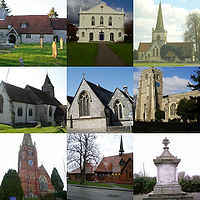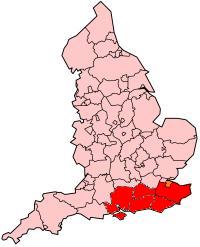Difference between revisions of "Category:Region 7 ~ South East England"
Darksecretz (talk | contribs) |
|||
| (19 intermediate revisions by 5 users not shown) | |||
| Line 1: | Line 1: | ||
| − | [[Category: | + | [[Category:England]] |
| + | [[image:Collage2.jpg|200px|right]] Region 7 consists of 5 areas. | ||
| − | |||
| − | + | We are looking for volunteers to take photographs of places of worship. This includes Churches, Chapels, Synagogues, Mosques, Temples, Meeting houses, Kingdom Halls and even ruins. Any pictures should be uploaded on to the Regional Projects board for [https://www.familytreeforum.com/forum/site-projects/regional-projects/england-wales-isle-of-man/33405-region-07-south-east-places-of-worship-photo-thread Region 7 - South East] | |
| − | * | + | |
| − | * | + | |
| − | * | + | To see which places have already been photographed just follow the links below |
| + | |||
| + | *[http://reference.familytreeforum.com/index.php/Hampshire_Places_of_Worship_Photos_ON_the_WIKI Hampshire] | ||
| + | *[http://reference.familytreeforum.com/index.php/Isle_of_Wight_Places_of_Worship_Photos_ON_the_WIKI Isle_of_Wight] | ||
| + | *[http://reference.familytreeforum.com/index.php/Kent_Places_of_Worship_Photos_ON_the_WIKI Kent] | ||
| + | *[http://reference.familytreeforum.com/index.php/Surrey_Places_of_Worship_Photos_ON_the_WIKI Surrey] | ||
| − | |||
It would also be really lovely if anyone has pictures of village, town or city life to add to the Wiki, it all helps to understand people and places and brings them to life. | It would also be really lovely if anyone has pictures of village, town or city life to add to the Wiki, it all helps to understand people and places and brings them to life. | ||
| − | Do you have any local stories, which you would like to share with other researchers? If so we would love to hear them, you can either contact the | + | Do you have any local stories, which you would like to share with other researchers? If so we would love to hear them, you can either contact the co-ordinator for your county or submit them directly to the Wiki. |
| − | The | + | The South East has been known for its areas of natural beauty for many years. The White cliffs of Dover stand majestically looking out over the English Channel. If the cliffs could talk they would tell stories of battles by air, land and sea. They would tell of returning adventurers and explorers and of hard working fishermen battling the elements to feed his family. |
| + | |||
| + | [[image:England SE Counties2.jpg|200px|right]]The South East itself is steeped in history. It's where battles were fought, where Kings were crowned, where beautiful castles were built and some destroyed. | ||
| − | |||
*Hastings in Sussex was where the Norman invasion began in 1066 | *Hastings in Sussex was where the Norman invasion began in 1066 | ||
| Line 27: | Line 32: | ||
| + | The South East has been associated with the sea for hundreds of years. Many people who lived here worked in the dockyards building the ships that sailed the world for exploration, trade and war, carpenters, rope makers, sail makers, smiths, joiners, wheelwrights, naval personnel and merchant seamen to name but a few. | ||
| − | + | The South East has also a great history with the fishing industry. In Hastings today you can still see the old fishing huts. Whole families would be involved, the men would do the fishing and the women and children would help with the processing of the daily catch. Many people also worked on the land, farming and raising animals, in Sussex in 1841 nearly half the working population were working in agriculture even children would help bring in the harvest, some schools would close during the harvest as the children would be working, the produce did not pick, sort and distribute itself so whole villages were involved. | |
| − | |||
| − | The | ||
| − | Many people also worked on the land, farming and raising animals, in Sussex in 1841 nearly half the working population were working in agriculture even children would help bring in the harvest, whole villages were involved. | ||
Latest revision as of 07:52, 16 May 2023
Region 7 consists of 5 areas.
We are looking for volunteers to take photographs of places of worship. This includes Churches, Chapels, Synagogues, Mosques, Temples, Meeting houses, Kingdom Halls and even ruins. Any pictures should be uploaded on to the Regional Projects board for Region 7 - South East
To see which places have already been photographed just follow the links below
It would also be really lovely if anyone has pictures of village, town or city life to add to the Wiki, it all helps to understand people and places and brings them to life.
Do you have any local stories, which you would like to share with other researchers? If so we would love to hear them, you can either contact the co-ordinator for your county or submit them directly to the Wiki.
The South East has been known for its areas of natural beauty for many years. The White cliffs of Dover stand majestically looking out over the English Channel. If the cliffs could talk they would tell stories of battles by air, land and sea. They would tell of returning adventurers and explorers and of hard working fishermen battling the elements to feed his family.
The South East itself is steeped in history. It's where battles were fought, where Kings were crowned, where beautiful castles were built and some destroyed.
- Hastings in Sussex was where the Norman invasion began in 1066
- Portsmouth in Hampshire has long been associated with the Royal Navy, and is home to HMS Victory and to HMS Ark Royal
- Runnymede in Surrey was the place at which King John signed the Magna Carter in 1215
- East Cowes on the Isle of Wight was one of Queen Victoria’s favorite homes, she used Osborne House as a summer residence but after the death of Prince Albert it became one of her permanent homes, she died there on 22 January 1901
- Chatham in Kent was the childhood home of Charles Dickens, there are many references to places in and around Chatham in his works.
The South East has been associated with the sea for hundreds of years. Many people who lived here worked in the dockyards building the ships that sailed the world for exploration, trade and war, carpenters, rope makers, sail makers, smiths, joiners, wheelwrights, naval personnel and merchant seamen to name but a few.
The South East has also a great history with the fishing industry. In Hastings today you can still see the old fishing huts. Whole families would be involved, the men would do the fishing and the women and children would help with the processing of the daily catch. Many people also worked on the land, farming and raising animals, in Sussex in 1841 nearly half the working population were working in agriculture even children would help bring in the harvest, some schools would close during the harvest as the children would be working, the produce did not pick, sort and distribute itself so whole villages were involved.
Pages in category "Region 7 ~ South East England"
The following 12 pages are in this category, out of 12 total.

